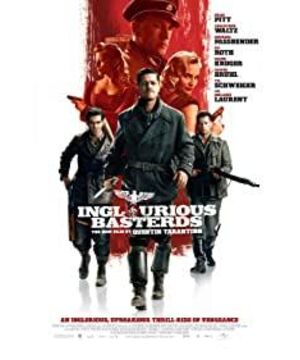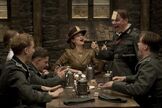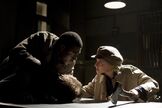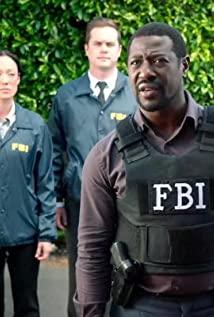OK, back to the topic, today I will talk about the new (last year) new work "Inglourious Basterds" (Inglourious Basterds, Chinese translation of "Inglourious Basterds" by the genius director Quentin Taron's mad slave. Hong Kong translation).
In fact, I believe that more people understand Quentin better than me (thinking), and I also believe that this new CULT film king has been as popular as the rebellious teenagers and fashionable men and women with superior tastes like Stephen Chow in the 1990s. I can't stand other people's words. It's like everyone on the altar chanting incantations at the same time, do you still need to chirp and talk non-stop there?
A Kill Bill with a hodgepodge of commercial elements and B-level movie flavors and a maverick pulp novel are estimated to surprise a lot of people (like I always like Kill Bill when I know the chest touches the sword, more than once in the BLOG like a believer compliments).
But just as Quentin playfully gives her a middle finger on the podium when a woman yells that Quentin is a fascist, so many people worship Quentin and treat his films as the golden rule of the Bible, we Leaving aside those purely emotional worship, going straight to the core, why is Quentin a genius? Why did Quentin become a master? I'm not a professional film critic, but since I'm a film and television practitioner now, let's try to analyze it from my shallow knowledge. Today, let's take "Xi" as an example.
[20 minutes of nonsense, 20 minutes of classics]
The film "Xi" is the most powerful and classic, only the first 20 minutes. I'm not saying that the latter part is not wonderful, I'm not saying that only those 20 minutes are the most worth watching of this film, but these 20 minutes are so wonderful that no matter how wonderful the latter part is, it can't surpass him.
If Kubridge flew into the sky with his bones and instantly switched to a montage of a spaceship and entered the annals of film history, then the first 20 minutes of Quentin's "Hee" is comparable to this classic montage. But compared to Kubridge's icy, 20 minutes Quentin's work is more like a surreal oil painting, full of color and mood.
In fact, the story of the first 20 minutes is super simple, that is, in 1941, a Nazi officer "Jewish hunter" went to a cow farm in France to conduct a search. Then the Nazi officer forced him to confess that he was hiding Jews in a conversation with the manor, but he let go of one of the little girls, which led to the back story.
The beauty of this play is that it creates a wonderful atmosphere of tension and oppression in the loose dialogue. At the beginning, the picture presents a very beautiful pastoral picture, and then the subtitles are marked with 1941. If you didn't read the subtitles, you would have thought it was an idyllic romance film just by looking at this picture, but anyone who saw the subtitles with a little bit of modern history knows that this was the age of beacon fires, and it was World War II.
Then the convoy of Nazi officers came slowly, and the owner of the manor greeted the officer with a heavy face. From here, parting ways with all the movies set in World War II - the Nazi officers on the face are polite, and the guards they bring don't rudely occupy the room, just stand silently in the distance. The officer and the manor owner exchanged a few words and entered the house. If you didn't look at the military uniform, you would think it was just a friend visiting.
After entering the house, the two continued to chat. The officer praised the beauty of the manor's daughter and asked for a delicious glass of milk. Although the owner of the manor could see that he was very nervous, he didn't know what the other party was doing, so he also pretended to be okay and answered the officer. Then the officer neatly took out ink, pens, and paper, and started investigating like the (shanren) neighborhood committee aunt. During this period, he continued to talk nonsense, saying things that had nothing to do with the story.
Looking at the respectful and polite appearance of the Nazi officer, I really thought it was just a very ordinary family investigation. However, when the plot progressed to the point where the officer asked the owner about a Jewish family that seemed to have disappeared and asked about the owner's details, the camera immediately panned to the ground floor. It turned out that the disappeared Jewish family was hiding in the owner's basement at this time. Now there is conflict and tension. On the one hand, the audience has to listen to the nonsense between the officer and the host (basically, the officer is talking by himself, and the host is silent and answering simple questions most of the time). , hanging over his head like the sword of Damocles.
Suddenly, the conversation changed, and the officer began to discuss the difference between squirrels and mice. He said why squirrels and mice are only the difference in the tail, and the mice are all screaming? Because mice live in sewers! They can spread disease!
I fuck this paragraph is really a stroke of genius, it suddenly raised the contradiction to a climax. This conversation seems to be vaguely telling the audience that he already knows someone in the basement - which is what the average commentator thinks. But I don't think so, I'm more inclined to be an officer's psychological tactic. In fact, the officer didn't know if it was really there, but when he said this, it seemed that he knew it, and he expressed it tactfully, because if you played hard, the opponent would immediately set up a stronger line of defense in his heart. Under this kind of psychological pressure, if he really hides it, it will definitely be broken. Sure enough, the manor's owner shed tears of remorse (?) and said in English (the Jews below don't understand) right below.
Next, the officer turned the table and shouted loudly for the guards to kill, right? no! Quentin is about to subvert the tradition, and the officer still takes his time, politely in French (the story takes place in France) and greets the owner's "daughters" (actually guards) to come in, but shoots the floor nonchalantly. Crackling, flesh and blood, this murder is a piece of performance art.
However, one person survived, and that is Susannah, one of the protagonists of the later story. She ran over the countryside, desperately escaping for her life. At this time, Quentin playfully gave a perspective shot of the door. Suzanne was running on the yellow-yellow-green countryside. With the door frame limiting the angle of view, it was like a poetic painting of a girl running in the countryside. But the officer pulled out his pistol, went out the door, aimed at Susannah, laughed wildly and prepared to pull the trigger. But in the end he didn't shoot, not because he was sympathetic at this time, but pure perversion - like a lion playing with his food. He didn't care whether to kill or not, he just thought it would be more fun if he didn't.
This play sucks. It should be noted that, except for the music when the Nazi officer appeared at the beginning and Susannah escaped from the basement, there was no music in the previous large piece of literature. But this play can create an atmosphere that other blockbusters can only use music to set off just by relying on the dialogue, plot, and shots, which is simply wonderful.
Christoph Waltz's acting skills are also very good, bringing the perverted Nazi officer to life. He is polite, logical, proficient in many languages (his French and English are shown in the opening scene), and on the surface he is amiable, but he is actually a pure opportunist who kills without blinking, killing is just a business (reminds me of " The Nazi officer who killed while playing the piano in Sintler's List). As one of the leaders of the SS secret police, he was scheming, and the splendid squirrel-rat comparison in the opening scene was perfect because it was an unassailable attack. Just imagine, what if the manor owner didn't hide it? Then this trick has become the same nonsense as before. But if you hide, then this trick seems to hit your heart, the dam is to the ant's nest.
[Fantastic idea]
In fact, the plot behind it is also very good. For example, the idea of slaughtering Nazis in a movie theater is really only a movie obsessive like Quentin who can come up with it. Who would have thought that movie theaters could still be used to kill Nazis before "Hee" appeared? You'd be called an idiot if you said that. Not to mention that Quentin is still "falsifying" history at the end of the film.
This movie has a Quentin flavor as always. The plot is loose, there are large paragraphs of meaningless dialogue and drama, and the heavy taste of B-level films is full of flesh and blood (in fact, it is less than the previous films). But each plot can be echoed back and forth, and when they are gathered together, they are like a big net.
In fact, as some people have said, Quentin's film is actually "using film to make film". A large number of unique language of the film, tribute and spoof of old films, all of which must be understood by people who have a good understanding of the film. For example, Leni Riefenstahl is mentioned many times in the film, and the place where the name of this famous German female director appears is irrelevant and completely unnecessary. why? This is Quentin's tribute to the film master. If you don't know who Lenny Riefenstahl is, can you tell from the movie alone? Absolutely not. If you don't know who she is, go and search for an old movie called "The Triumph of the Will", and then search for her deeds, you will know why Quentin is so deliberately and naughty in "Hee" Tribute to her.
View more about Inglourious Basterds reviews











